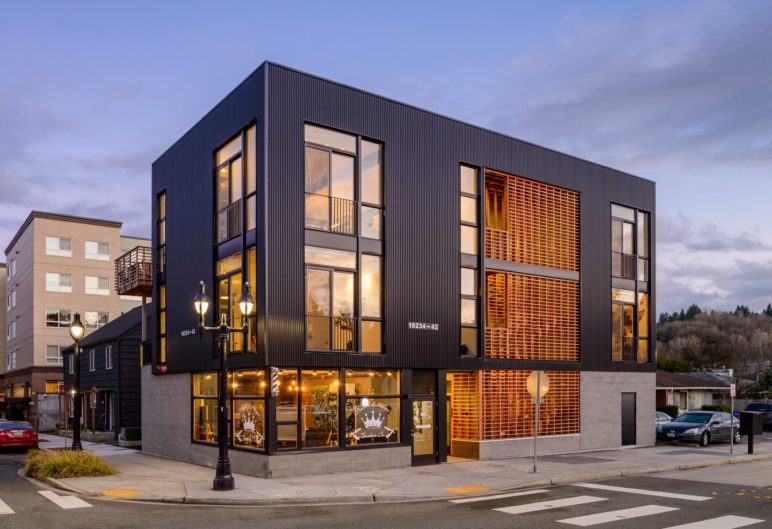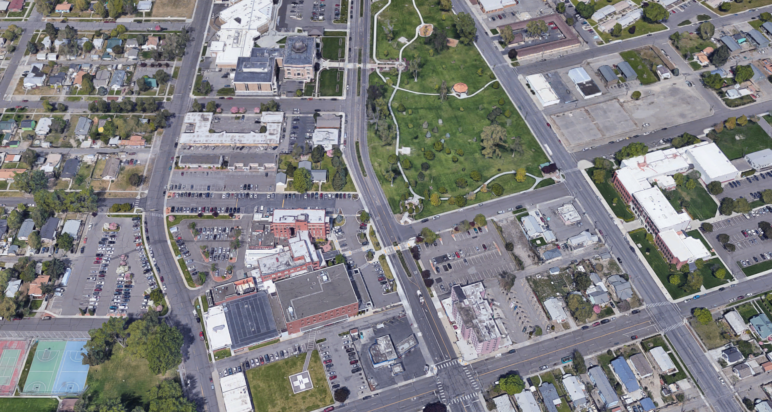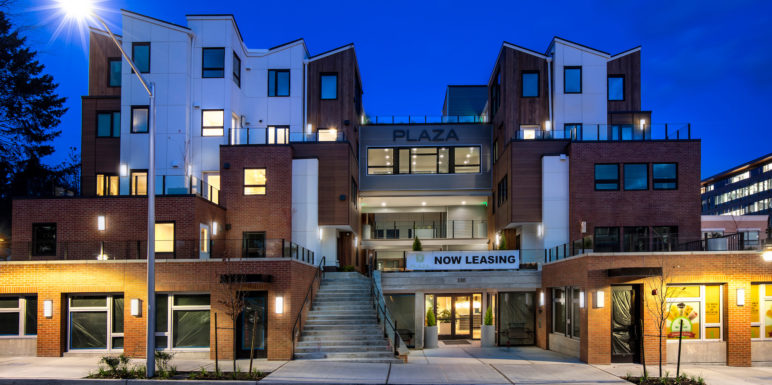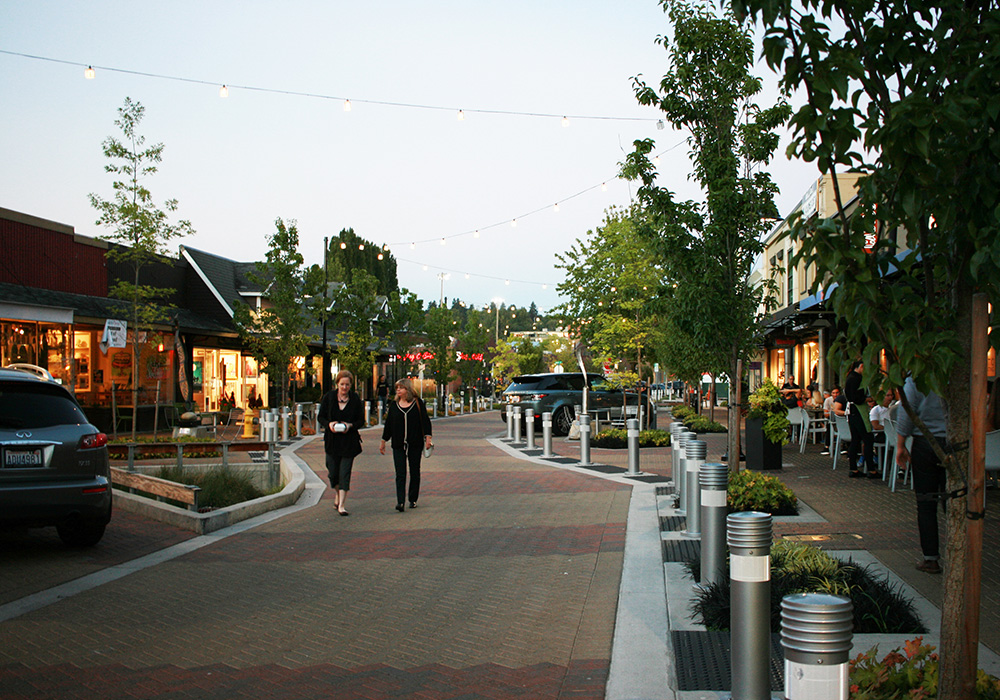Find audio versions of Sightline articles on any of your favorite podcast platforms, including Spotify, Google, and Apple.
This article is part of the series Legalizing Inexpensive Housing
UPDATE 2/27/23: An amended bill, which narrowed the reform to ¼ mile around transit stations, passed out of the House Local Government Committee by a 4-3 vote. HB 1351 will now go to the Rules Committee and then the House Floor.
Washington could be next to join Oregon and California in re-legalizing homes and business located in transit-rich areas, regardless of how many parking spots they have.
HB 1351 is the first bill introduced in Washington to focus specifically on reducing parking mandates—local rules that force every new building to include particular amounts of parking, regardless of how much residents and visitors use. The increased flexibility would let areas well-served by transit to add more housing choices and business opportunities, allowing cities to grow more like they used to.
The bill would strike down local parking mandates across the state for properties that are within a half-mile of stations served by transit that operates every 15 minutes at peak weekday hours, and a quarter-mile from stations with 30-minute peak service. The bill was introduced in the state House on Friday by freshman Rep. Julia Reed (D-36).
The reform builds on Washington’s HB 2343, which in 2020 imposed caps on parking requirements for senior, multifamily, and affordable housing developments near frequent transit. Since then, both Oregon and California have begun statewide rollbacks of parking mandates along transit lines. Those states’ reforms took effect on January 1.
A poll about Washington’s housing crisis, conducted by Lake Research Partners last year, found that 55 percent of Washington voters would favor such a measure. (Another 22 percent opposed.)
Washington cities would still be able to impose parking requirements on a case-by-case basis, subject to a few conditions.
Rolling back parking mandates would address housing shortage
Even as Washington’s housing shortage doubled in the past 7 years from 64,000 needed homes in 2012 to 140,000 in 2019, most communities have continued to require that every new home have a certain number of parking spots, no matter how many residents will actually use.
In the Seattle Metro area, almost half the land within a half-mile of existing or planned rail and bus rapid transit stations still requires at least one parking spot for every home, even a studio apartment. Nearly half of that, 24 percent of the total land studied, mandated two parking spaces or more, according to a new housing report by the Urban Institute.
Unused parking created by these mandates has huge costs. King County estimated in 2015 that parking in multifamily buildings costs between $20,000 to $40,000 per stall. Builders in the area say costs today are far higher, coming in at $50,000 to $80,000 per space. At 350 square feet per car, space for parking takes away from buildable land that could otherwise be used to house Washingtonians.
“It holds us back from building as much as housing as we could,” said architect Cary Westerbeck of Bothell, WA. In the course of his work, parking minimums regularly prevent building as many homes on a property as could otherwise fit. “It’s the tail that wags the dog,” he said. “You figure out what you can park, then you figure out what you can build.”
A fourplex he built in downtown Bothell easily could have had twelve homes, he said, if it had not been for the parking requirements. There was plenty of height to build additional stories because of the downtown location, but the small 2,600-square-foot lot could only accommodate four parking spaces. Because every apartment legally required a parking spot to exist, eight homes ultimately went unbuilt.

That same building Westerbeck dreamed of building in Bothell would have been legal to build in Seattle. That city eliminated parking mandates in central and transit-adjacent neighborhoods back in 2012. In the five years that followed, a study found that 59 percent of the homes permitted since would have been illegal under the old rules, even though 70 percent of new buildings still chose to provide parking.
Other Washington bills to increase housing supply include reductions of parking requirements to give builders as much flexibility as possible. HB 1110 would eliminate parking mandates for middle housing types, like fourplexes, that are within a half-mile of transit stations with 15-minute or better service, and cap parking mandates on lots elsewhere. HB 1337 also would prohibit parking mandates for accessory dwelling units statewide, in an effort to lower regulatory barriers.
Bill would re-legalize historic development in growing communities

Washington’s proposal would go further than California’s parking reform in one way: It would include transit stops that receive service every 30 minutes at peak time, instead of just 15 minutes. Defined as “Level 3” service by the state transportation department, including this additional tier of transit would expand coverage to cities like Olympia, Aberdeen, Wenatchee, and Pasco, which can often be left out of state initiatives related to frequent transit.
“If we had to build off-street parking at today’s standards, and you apply that to every business in the city of Pasco, the entire city would be covered in asphalt.”Pasco planning manager Jacob Gonzalez

Planning manager Jacob Gonzalez keeps a post-it note on his monitor that reminds him daily that 48,000 more people are expected to live in Pasco by 2038. That’s a dramatic change from the small city of 30,000 he grew up in. “What does it mean to have another Pasco, on top of Pasco?” Gonzalez asked. “If you could do it all over again, would you do it the same?”
Many homes and businesses currently operating in Washington would be illegal to build today, since they were built at an earlier time when zoning was less restrictive. “If we had to build off-street parking at today’s standards, and you apply that to every business in the city of Pasco, the entire city with would be covered in asphalt,” explained Gonzalez. “I don’t think anybody would think that’s a great environment.”
Pasco is taking its first crack in decades at reducing parking mandates. Last year, accessory dwelling units were legalized with full flexibility to not include parking. Gonzalez is currently drafting a proposal to expand the area where parking is optional in the central city. Another pending update to the residential building code would lower requirements for studio and one-bedrooms from two parking spots each to just one. But that’s unusual. Most Washington cities try to avoid the issue.
Flexible parking supports low-cost housing

Once completed, the largest Habitat for Humanity building in the world will be located in Seattle, a few blocks away from the Columbia City light rail stop. None of the 58 households will have an assigned off-street parking spot. That’s not uncommon. Most of the buildings Habitat’s Seattle chapter has in the pipeline don’t include parking at all.
Despite the widespread need for more affordable housing options across the state, few other jurisdictions would allow for the same building, even in their downtown core. Across Lake Washington in Kirkland, even micro apartments without full kitchens are required to have one parking spot for every two households.
Angela Rozmyn, Director of Sustainable Development for housing developer Natural and Built Environments, said that is still more parking than what residents need. In those types of buildings, only 30 to 40 percent of the residents own cars.
“We pretty much have to battle it with every single project,” Rozmyn explained. Her company regularly asks for variances to lower the parking ratio further. Under the proposed rules, parking spaces would no longer limit the number of homes that could be built in this area.
These apartments are some of the few housing options in Kirkland that cost less than $1,000 a month, half as much as nearby studio apartments, and demand is high. Many of the residents who live in these buildings are area service workers, Rozmyn said, the vast majority working less than five miles away.
State action is needed, advocates say
Washington currently has the fifth worst housing shortage across the United States, and conditions aren’t exactly ripe to make up the shortfall. The building industry is facing headwinds of rising materials and labor costs alongside a tightening lending market. Housing permits in the United States have declined 22 percent from a year ago.
“It was hard enough back when interest rates were three-and-a-half percent,” said Westerbeck. “More often than not, it’s really hard to make a small project pencil.” Westerbeck explained that multifamily housing with 20 or more apartments starts to take advantage of economies of scale. But smaller sites have less room to make everything work. Without parking requirements in the way, Westerbeck thinks the dam would break open on small housing and commercial projects.
For Washington to build the estimated one million new homes needed in the next twenty years, something will need to give.
Relying on reform to happen one city at a time has only led to a trickle. Even leaders like Bothell’s mayor Mason Thompson, who support removing parking mandates, haven’t attempted to reform them yet. “It’s a pretty big lift in terms of educating the public,” said Thompson. “Few people understand the far-reaching ramifications of parking minimums, and how much they negatively affect issues that are priorities for Bothell residents like climate change, traffic, and the city’s budget.”
“I would love the state to do it,” Thompson said.
You can track this bill’s progress here.



Comments are closed.